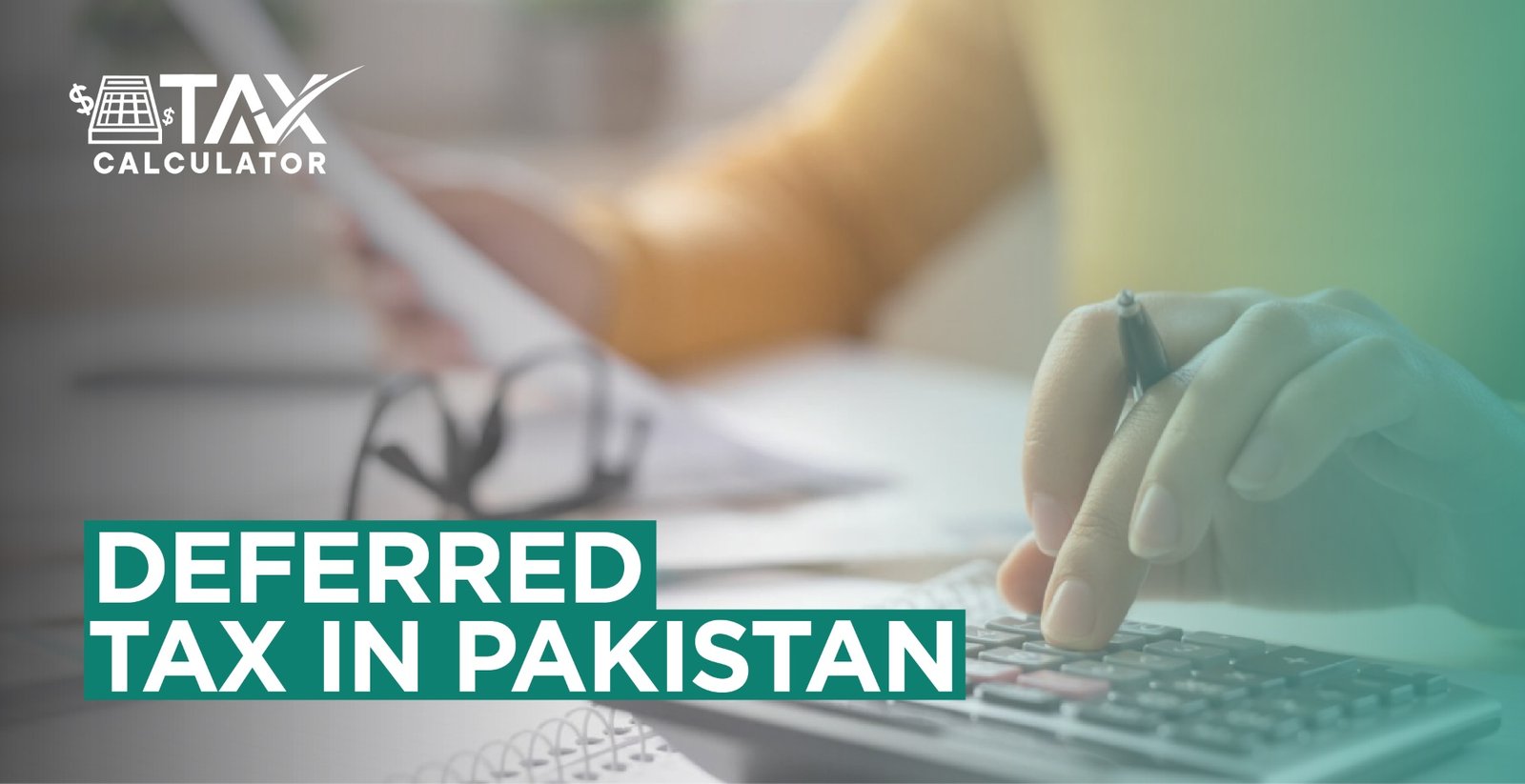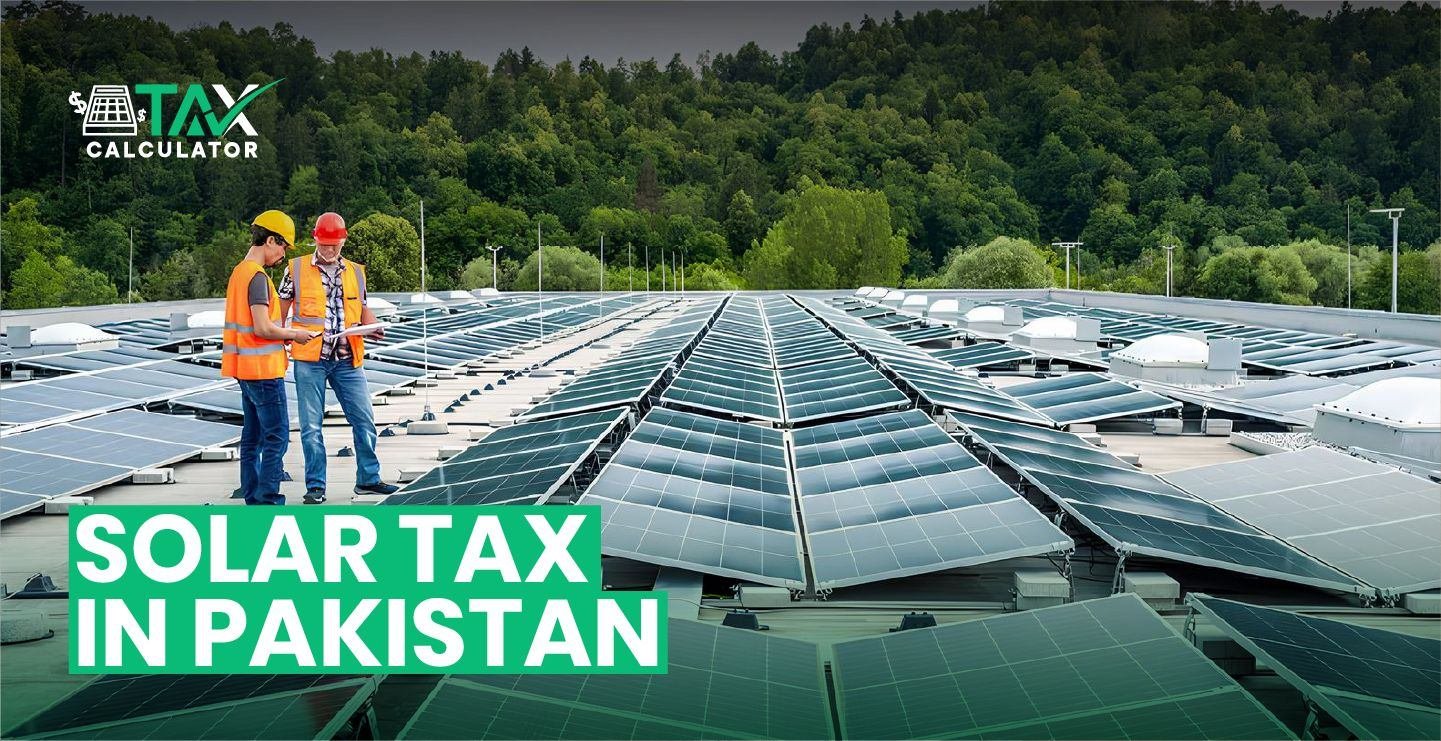Taxes in Pakistan can feel complicated with so many types, rates, and rules changing every year. Whether you are a salaried person, a freelancer, or running a business, understanding how each tax works can save you stress, money, and even penalties.
In this guide, we break down all the types of taxes in Pakistan, including income tax, sales tax, withholding tax, property tax, and provincial taxes. It also flags the practical changes from the Budget/Finance Act 2025–26, so you can see which rules matter right now and which ones to watch.
So, if you have ever wondered where your money goes or how to stay compliant without confusion, this post is your complete roadmap.
Quick Overview of Pakistan’s Tax System
Taxes in Pakistan are collected on three tiers: Federal, Provincial, and Local. Each tier collects different types of taxes.
- At the Federal level, the Federal Board of Revenue (FBR) collects the main taxes, which are income tax, sales tax on goods, customs duties, and federal excise duties. These are essential to the country’s revenue.
- At the Provincial level, the four provinces: Punjab, Sindh, Khyber Pakhtunkhwa, and Balochistan collect taxes on services, property, and professions through the respective revenue authorities: Sindh Revenue Board (SRB), Punjab Revenue Authority (PRA), Khyber Pakhtunkhwa Revenue Authority (KPRA), and Balochistan Revenue Authority (BRA)
- Lastly, Local governments and municipal bodies collect smaller taxes and charges that include property, water, and local business in order to provide community and infrastructure services.
These layers combine to shape the basic taxation in Pakistan, how individuals and businesses contribute to the development of the country, region, and here in Pakistan, the provinces.
Direct Taxes
Direct taxes in Pakistan are those paid directly to the government, primarily administered by the Federal Board of Revenue (FBR). They shape how individuals and businesses contribute to the economy through income tax, corporate tax, and capital gains.
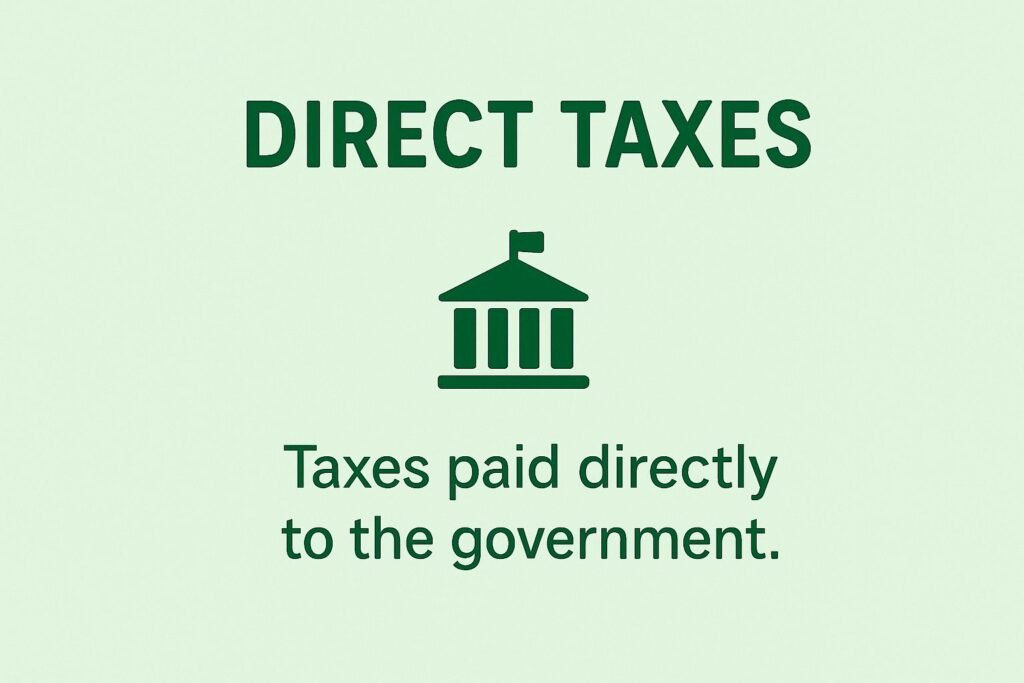
1. Income Tax
Income tax is the most familiar one: it’s a tax on the income you earn, whether as salary, profit, rent, dividends, or interest. The legal liability is on the person or entity earning that income. Whether you are an employee, a consultant, a company, or an AOP, you are subject to income tax rules, but the exact treatments differ.
Categories of Taxpayers & Their Treatment
- Salaried individuals are taxed on their salary plus possible other income (less adjustments).
- Non-salaried / self-employed / professionals taxed on business or professional income, with allowances, expenses, etc.
- AOPs are taxed similarly to individuals, but with the combined income of the group.
- Companies (private and public, including banks) are taxed on profits (after allowable expenses).
Current Tax Slabs / Rates (2025-26)
| Category | Income Range (PKR) | Tax Rate / Formula |
|---|---|---|
| Up to 600,000 | 0% | Exempt |
| 600,001 – 1,200,000 | 1% | On excess above 600,000 |
| 1,200,001 – 2,200,000 | 11% | On excess above 1,200,000 + base tax |
| 2,200,001 – 3,200,000 | 23% | On excess above 2,200,000 + base tax |
| Above 4,100,000 | 35% | On excess above 4,100,000 + base tax |
Salaried income up to PKR 600,000 is tax-free. If your income exceeds PKR 10 million, an additional 9% (for salaried) or 10% (for non-salaried) surcharge applies under the Finance Act 2025.
Surcharges, Super Tax & High-Income Levies
As noted, if a person (salaried or non-salaried) exceeds PKR 10 million in taxable income, a surcharge applies: 9% for salaried, 10% for non-salaried. For companies with exceptional profits, the super tax can be applicable (especially if directed by budget legislation). High-income individuals (or companies) may face additional levies depending on special rules in the Finance Act.
Minimum Tax, Advance Tax, and Alternate Corporate Tax
- Minimum tax: even if a business reports a loss, in some sectors, a minimum tax (based on turnover) may apply.
- Advance tax: certain payments (e.g., to contractors, importers) require you to pay tax in advance (a withheld portion), which is adjustable.
- Alternate corporate tax: In specific cases, companies cannot avail full deductions, so an alternate rate may apply.
These provisions ensure that tax is collected at different points, reducing evasion.
Sources of Income
When you compute income tax, it’s not just your salary or business profit:
- Business profits / professional income
- Rental income tax
- Interest
- Dividends
- Capital gains (depending on holding period)
- Other miscellaneous income
Each source may have its own rules for deduction, withholding, or exemptions.
Exemptions, Deductions & Reliefs
The law provides relief to reduce the burden, for example:
- Deductions for approved charitable donations
- Tax credits for investment in specified instruments
- Retirement scheme contributions
- Exempt income brackets
- Relief for agricultural income (though recent policies may bring changes)
Always check which reliefs are active in that tax year.
Filing, Deadlines & Penalties
- You must file an annual income tax return, usually after the fiscal year ends (by dates set by FBR).
- FBR and provincial authorities publish filing deadlines in notices/circulars.
- Missing deadlines, under-reporting, or nondisclosure can lead to penalties, interest, and audits.
- It’s better to file timely with honest reporting than fight an assessment later.
2. Capital Gains Tax (CGT)
This is tax when you sell an asset for a profit (the difference between the sale price and the cost basis).
Subject Assets & Definitions
- CGT may apply to securities (listed shares, mutual funds)
- Immovable property (houses, land, etc.)
- Other capital assets as defined by law.
Holding Periods, Rates & Exemptions
- For listed securities, short holding periods attract higher CGT; longer holding periods may reduce or be exempted.
- For immovable property, holding period matters (e.g., if held beyond certain years, tax is reduced or exempt).
- There are exemptions in certain situations (e.g, transfers to close relatives, small gains), depending on law changes.
Because CGT rules change often, always check the latest law or SRO.
3. Withholding Taxes (WHT)
Withholding tax is often the first line of tax collection, where payers deduct tax before making payments. WHT ensures tax is collected at source, preventing evasion, and helps the government’s cash flows.
Payments subject to WHT include:
- Salaries (tax deducted at source)
- Dividends
- Interest
- Payments to contractors/commission agents
- Service payments
- Rent/lease payments
- Importers/exporters
Rates vary based on whether the payee is a filer or a non-filer. For example, non-filers often attract double or higher rates. WHT is often adjustable, i.e., it’s not “extra” tax but gets credited against final liability.
Impact on Cash Flow & Compliance
If you are a business, you must maintain policies to deduct WHT timely, deposit with the government, and give documentation (certificates). Mistakes or delays can attract penalties. Some individuals or smaller businesses find WHT burdensome, especially when contracts don’t account for tax withholding, so you should negotiate “gross vs net” carefully.
4. Other Direct Taxes
- Property Tax / Capital Value Tax: Often levied by municipal or provincial bodies on land, buildings, or property valuations. The rates, frequency, and valuation methods differ widely from city to city.
- Wealth Tax / Wealth Reconciliation Tax: While Pakistan does not have a broad “wealth tax” currently, certain budgets and proposals introduce wealth reconciliation or declared assets regimes. Monitor if new laws reintroduce such levies.
- Corporate Asset Tax: In rare cases, companies may face tax on assets held (e.g., idle lands) under special provisions in tax law or budget.
- Professional Tax (by Provinces): Some provinces levy a separate tax on professionals, doctors, lawyers, consultants, etc., under provincial law. The amount is typically modest (flat fee) but must be accounted for locally.
Indirect Taxes
Unlike direct taxes, indirect taxes are collected through goods and services, and you pay them without even noticing.
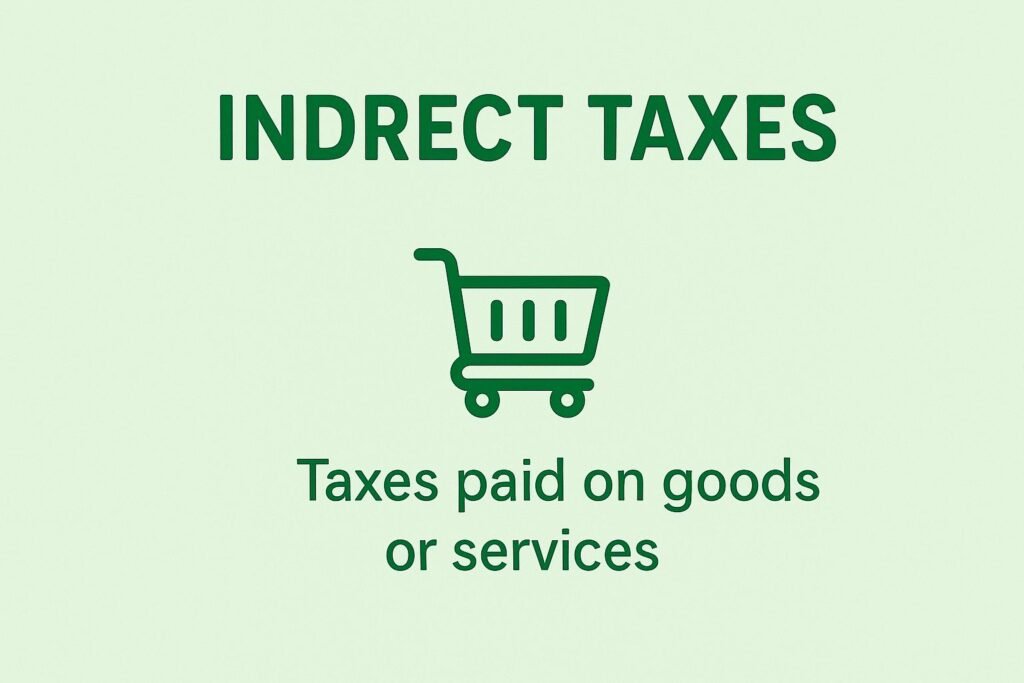
1. Sales Tax / VAT
Sales Tax is Pakistan’s version of VAT for goods and, in some contexts, services.
On Goods (Federal Level)
- Standard sales tax (GST-style) rate is 18% on most goods.
- Some goods imported or locally manufactured may face a higher rate (25%) under special rules.
- Imports often attract sales tax plus additional VAT (e.g., 3%) at the import stage.
Businesses with taxable supplies need to register as a company or industry, collect, file periodic returns, and claim input tax credits (i.e., tax paid on inputs), a common VAT practice.
On Services (Provincial / Federal Mix)
- Sales tax on services is not fully imposed by the federal provinces; instead, it is imposed via service tax laws (or the FBR covers some via Islamabad/ICT).
- For example, Sindh has set its general rate at 15%, except for telecommunications services (19.5%), Government of Sindh
- Some provinces offer reduced rates for encouraging digital payments: e.g., SRB (Sindh) gives 8% rate on restaurant services when payment is digital.
- In Punjab, Khyber Pakhtunkhwa, etc., service tax often hovers around 15–16% depending on service type.
Special regimes exist (e.g., fixed tax, retail/final tax) for small service providers or specific sectors.
2. Customs Duties / Import Duties
When goods cross national borders, import duties, customs duties, regulatory duties, and additional customs charges apply.
- Goods are classified via HS codes.
- Import duty rates vary by product, country of origin, trade agreements, and other factors.
- Additional charges (regulatory duty, Additional Customs Duty) may be imposed to protect the local industry or manage trade deficits.
- At the import point, you may pay sales tax / VAT, customs duty, and other levies altogether.
These duties often make imported goods more expensive and shape trading decisions.
3. Federal Excise Duty
Excise taxes are applied to certain goods or services above and beyond the general sales tax.
Items like cigarettes, beverages, and luxury goods are often subject to excise. Some services may also be excisable under special provisions. The rates are specific, often sector-based, not fully “percentage of everything.” Compliance for excise involves additional registration, returns, and audits.
4. Digital Economy / Digital Presence Taxes
As digital trade grows, Pakistan has tried to adjust its tax regimes.
- The Digital Presence Proceeds Tax Act, 2025, introduced a 5% withholding tax on gross proceeds from foreign digital service providers (e.g., Google, Netflix) to customers in Pakistan.
- However, that 5% tax was suspended via SRO 1366(I)/202,5 effective 1 July 2025.
- Still, standard sales tax / VAT rules continue to apply to digital goods (e.g, 18% on goods, and service taxes at provincial rates)
- The Finance Act 2025 also introduced a 2% Sales Tax (GST) on digitally ordered goods, collected by payment gateways or courier services.
- For e-commerce, online marketplaces, and cross-border sellers, they must be aware of provincial and federal rules, and potential withholding (1%) for unregistered suppliers.
This is a fast-evolving area, so keep watching for new SROs or clarifications.
Provincial & Local Taxes
Beyond national taxes, provinces and local governments impose their own.
- Service/sales tax on services by provinces (Punjab, Sindh, KPK, Balochistan) under their respective service tax acts.
- Professional tax (for professionals) at the provincial level.
- Land/property / municipal taxes at the city, district, or municipal level.
- Local charges/levies/betterment fees, etc
These are often less “big ticket” but must not be ignored, as noncompliance can create local legal or operational issues.
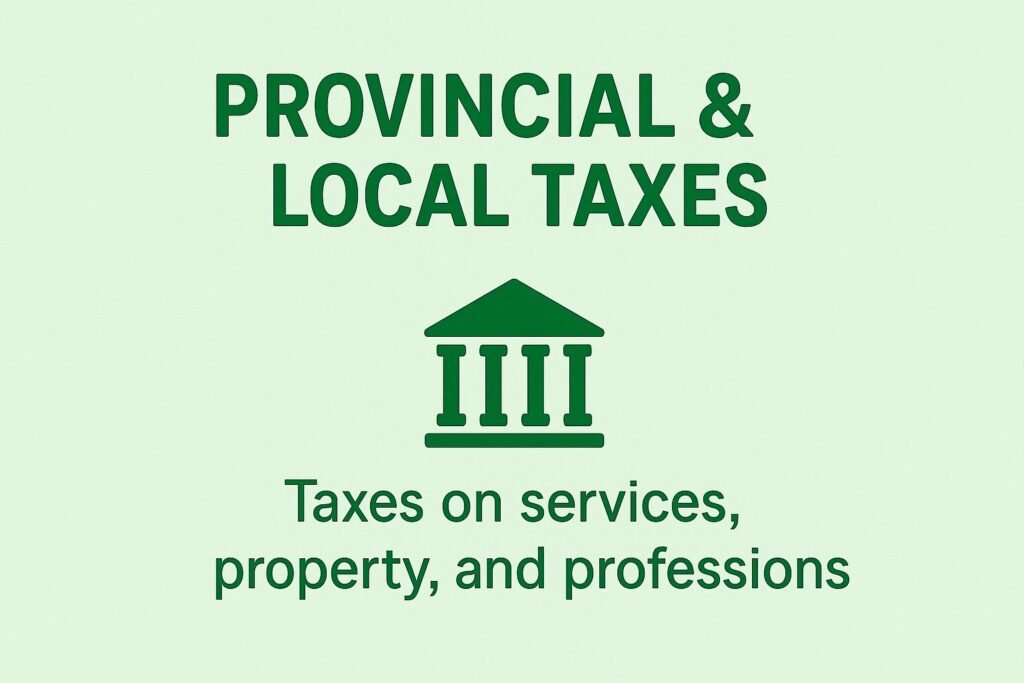
Special Tax Regimes & Reliefs
Governments often enact special rules to encourage investment, growth, or fairness.
SME / Small Business Regimes
- Many tax regimes classify small or starting businesses to give them simpler compliance, lower rates, or final tax (i.e., flat tax instead of full books).
- Some SMEs may be eligible to pay final tax (i.e., no further income tax) on a turnover bracket.
- The Finance Act or provincial rules may provide threshold ceilings.
Incentives & Exemptions
- Export incentives to promote exports, many export revenues may be taxed favorably or exempted.
- Special Economic Zones (SEZs) or industrial zones may grant tax holidays or reduced rate periods.
- Sectoral incentives: IT, agriculture, renewable energy, etc.
- Investment incentives: tax credits, deduction allowances, accelerated depreciation, etc.
- Double Taxation Agreements (DTAs). If you earn income abroad, you may avoid double taxation via treaty relief.
These incentives can significantly reduce the effective tax burden, especially for growing businesses.
Compliance, Procedures & Penalties
Knowing the types of taxes is one thing; complying correctly is another, and that’s where many people struggle.
- Registration: You must register for income tax (get NTN), sales tax (if turnover or goods supply qualifies), import/export (customs registration), etc. For services, provincial registration with revenue authorities may also be necessary.
- Record Keeping & Documentation: Keep books, invoices, receipts, bank statements, digital records, etc. Retain records for the statutory period (often 5–8 years). For withheld taxes, keep certificates/evidence.
- Returns & Payments: File annual or periodic returns (monthly, quarterly) depending on tax type. Pay taxes (or withheld amounts) within deadlines. For withheld taxes, deposit the withheld amount to the government treasury and issue certificates.
- Assessments / Audits: Tax authorities may audit your books, issue assessments, or request explanations. If they find underreporting, they may raise additional taxes, interest, and penalties.
- Penalties & Interest: Late filing / late payment incurs interest and fines. Underreporting, fraud, and concealment carry heavier penalties. Non-filers may face double or multiple rates (e.g., WHT for non-filers is often higher).
In short, following proper procedure, even if time-consuming, can prevent costly disputes.
Recent Changes (Budget 2025-26) & What To Watch
If you haven’t been following the latest Finance Act, some of these changes will directly affect you or your business:
- Relief for Salaried Class: As mentioned, the tax-free threshold is up to PKR 600,000/year. Other slabs have been adjusted downward for many middle-income incomes. Daily Pakistan English News
- Adsted WHT Rates: Specified vs non-specified services, and special treatment for IT/IT-enabled services. ProPakistani
- Increased WHT on Cash Withdrawals by Non-Filers: 0.8% on daily withdrawals over PKR 75,000 for non-filers. Daily Pakistan English News
- Reduced WHT on Some Property Transaction Types: Intended to give relief to property buyers. Daily Pakistan English News.
FAQs
Who is a 40% taxpayer?
A 40% taxpayer is someone whose income falls into the highest FBR tax slab under the Finance Act 2025. Only the portion of income in that top bracket is taxed at 40%, not the entire amount.
How much tax do I pay?
Your payable tax depends on your income, filing status, and FBR tax slabs. You can easily find out your exact amount using an online tax calculator that instantly estimates your tax for 2025 based on the latest rates.
Do I need to pay tax on my savings?
Yes, if your savings earn profit or interest, it’s usually subject to withholding tax deducted by banks. The rate depends on your FBR filer status and the type of account.
Conclusion
Tax laws in Pakistan evolve every year through Finance Acts, FBR circulars, and provincial updates from authorities like SRB, PRA, KPRA, and BRA. Staying informed is more about making smarter financial decisions. By keeping track of official updates and understanding where your income fits within current slabs, you can often reduce your tax burden legally and effectively.
Still unsure about your tax situation? Get expert help today! Call +92 321 6306286 or use our Pakistan Tax Calculator to estimate your taxes instantly. A little clarity today can save you a lot tomorrow.


